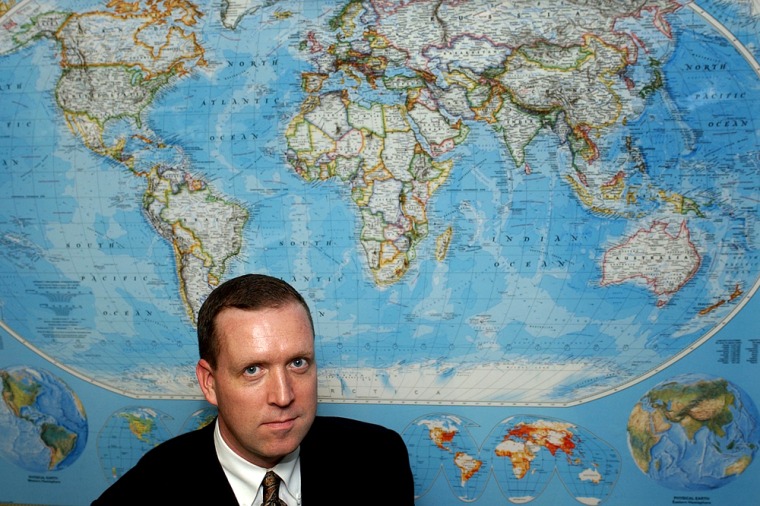Jolted by the 2001 terror attacks that left a smoking hole in the Pentagon, Defense Department officials turned to a Harvard-trained, "Star Trek"-quoting Navy analyst to help make sense of America’s new role in the world.
Thomas P.M. Barnett had worked to forecast new global threats in a project with Cantor Fitzgerald, the bond-trading firm that lost 658 workers at its World Trade Center headquarters on Sept. 11, 2001.
Barnett’s lexicon is laden with pop culture terms, not the acronyms common at the Pentagon. In his view of the world, the bad guys are in “the Gap,” and the good guys belong to “the Core.”
“The reason I never catch any flak is, it’s a larger discussion of how the world works that corroborates what they’re trying to do,” Barnett said in a recent interview with The Associated Press.
“I don’t think it’s prescriptive, in terms of telling the Defense Department what to do. I’m not telling the Pentagon, as the military would say, how to suck eggs. But it expands the definition of eggs to be sucked.”
Globalization and the Gap
At the Pentagon, Barnett laid out his view of the post-Cold War world: The biggest threats against the United States come from developing countries left behind by globalization — which he calls the Gap.
In the Gap, Barnett says, dictators like Saddam Hussein and terrorist groups like al-Qaida are trying to keep people disconnected from the rest of the world so they can be dominated and repressed. The Gap’s villains strike at the United States and its globalizing partners — countries Barnett calls the Core — to try to enforce that separation, Barnett says.
“Look beyond globalization’s frontier,” Barnett writes in a new book called “The Pentagon’s New Map,” “and there you will find the failed states that command our attention, the rogue states that demand our vigilance, and the endemic conflicts that fuel the terror we now recognize as the dominant threat not just to America’s future security but to globalization’s continued advance.”
The message for the military was one many in the Pentagon brass had struggled against for years. Instead of girding for a high-tech war with a competitor like China, Barnett says, the U.S. military must play the role of global enforcer, taking out terrorists and rogue regimes in the Gap and sticking around to help connect those countries to the global marketplace of goods, services, information and ideas.
That means a lot of smaller conflicts and long-term nation-building of the sort Pentagon generals had worked to avoid and Bush administration officials derided in the years leading up to the 2001 terrorist attacks.
Philosophy and the Pentagon
The post-attack Pentagon was much more receptive to his ideas, said Barnett, who spent two years as assistant for strategic futures in the Office of Force Transformation before returning to the Naval War College last year. In fact, Barnett says, his Core-Gap ideas help explain what the Pentagon is doing in Afghanistan and Iraq.
Echoes of Barnett’s ideas can be heard when Defense Secretary Donald H. Rumsfeld says terrorists don’t have armies, navies or air forces or when his deputy, Paul Wolfowitz, says a democratic Iraq will serve as an example for the rest of the Middle East.
Barnett, in his early 40s, recently briefed a group of new one-star generals and has presented his ideas to younger U.S. officers, NATO allies and officials from countries in the Gap.
No 'drive-by regime change'
Barnett may seem an unusual fit with a Pentagon leadership of conservative Republicans. A lifelong Democrat who once taught a course on Marxism at Harvard, Barnett strongly supports the war in Iraq while criticizing the Bush administration for failing to clearly explain its goals.
“We need to develop a story that’s compelling about how to make the world a better place. We don’t just need drive-by regime change,” Barnett said.
Making the world a better place is a main theme of Barnett’s book, which argues for the use of American military might to get rid of repressive regimes in the Gap to pave the way for integration of those countries into the globalized marketplace.
To do that, Barnett says, the U.S. military needs to split into two forces: one traditional military force and another, larger corps of troops to help with reconstruction — what the Pentagon calls “civil affairs.”
The United States has no military rival “in the same ZIP code” but has nowhere near enough resources to stabilize and rebuild a country after winning combat, he says.
Still, Barnett is optimistic.
“I see a lot of great potential in the Defense Department,” he said. “I truly believe it is an important force for good.”
'Star Trek' optimism
Barnett’s book is filled with pop-culture references and sports analogies — like comparing Cold War studies to "Star Trek."
“Much as in the short-run TV show encompassing only 79 episodes, there were only so many ’stories’ in the Cold War you needed to master in order to be considered professionally trained,” he says.
But he says his fondness for the optimistic “Star Trek” view of the future does not mean his predictions are wrong.
“The only futurists who are right are the optimists,” Barnett declares.
